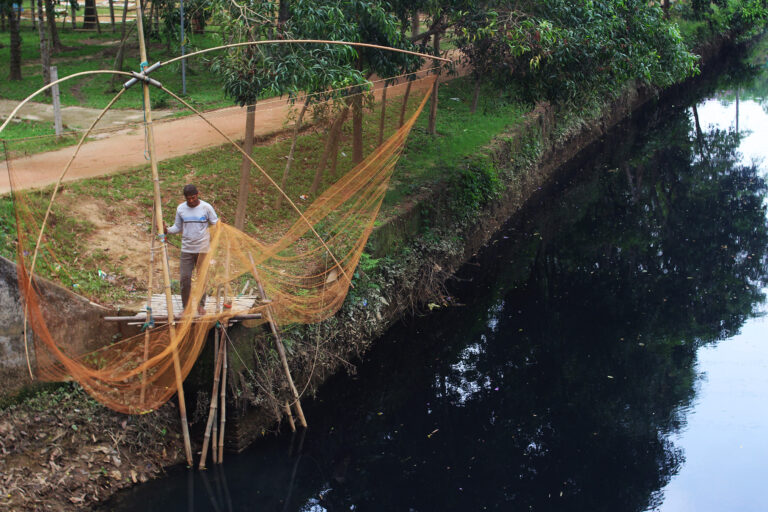At Abdullahpur Government Primary School in Akhaura area, in eastern Bangladesh’s Brahmanbaria district, the day begins with the stench of sewage wafting from an adjacent canal, Katakhal. Located in eastern Bangladesh’s Brahmanbaria district, the Akhaura channel makes up a stretch of about 4 kilometers (2.5 miles) of the cross-border Katakhal canal which originates in Agartala, the capital city of the Indian state of Tripura. After crossing the India-Bangladesh border at the border outpost, the canal flows for about 8 km (5 mi) through Bangladesh before draining into the Titas River. “We struggle to concentrate on lessons because of this disturbing odor. Teachers remain vigilant so that no child goes close to the canal,” Mahmuda Akhter, one of the schoolteachers, tells Mongabay. Mahmuda says she deplores the canal carrying pitch-black water year-round. She says she has not seen any remedy since she joined the school in 2013. It was reported in 2017 that the erstwhile kings of the princely state of Tripura originally created the channel to ferry goods to and from the Bangladeshi regions. After the countries’ partition in 1947, transportation stopped and the canal gradually turned into a drainage conduit for Agartala’s municipal and industrial waste. Some local people from Akhaura, like middle-aged farmers Jaan Miah and Nazrul Islam, say they have never seen the Katakhal water clean. Especially in the dry seasons, the water quality falls drastically, they say. The Bangladeshi government is concerned about the problem of water pollution by the cross-border channel. Periodically, the Border Guard…This article was originally published on Mongabay
Search
Recent Research
Want your Blog Article featured on our website?
Research
Featured News
Explaining Katsina’s Massive Leap to 2nd Position in the 2025 Climate Governance Ranking
In 2024, during the first edition of the Subnational Climate Governance Performance Rating and Ranking,
COP30: Firm to connect institutions with international climate finance opportunities
SISTME, a climate change and biodiversity conservation consulting firm based in Argentina, has offered to
From resistance to planetary governance, Indigenous women redefine global climate action
While world leaders negotiate behind closed doors in the Blue Zone of COP30, Indigenous Women
Sahara Group Foundation launches 16th Sahara Go Recycling Hub to boost environmental sustainability, economic empowerment
Sahara Group Foundation, the corporate social impact arm of Sahara Group, has commissioned its 16th
Climate finance is the lifeblood of climate action – Simon Stiell at COP30
Remarks delivered by UN Climate Change Executive Secretary, Simon Stiell, at the third High-Level Ministerial
UNDP, REA, GEF commission Plateau solar mini-grid to power agricultural value chains, empower rural communities
The United Nations Development Programme (UNDP), in partnership with the Rural Electrification Agency (REA) and
COP30: Africa urges world leaders to turn pledges into action
Africa has called on the world leaders to turn their pledges into action regarding the
Thousands join global marches calling on govts at COP30 to deliver climate justice
An estimated 30,000 people marched through the Brazilian city of Belém on Saturday, November 15,


